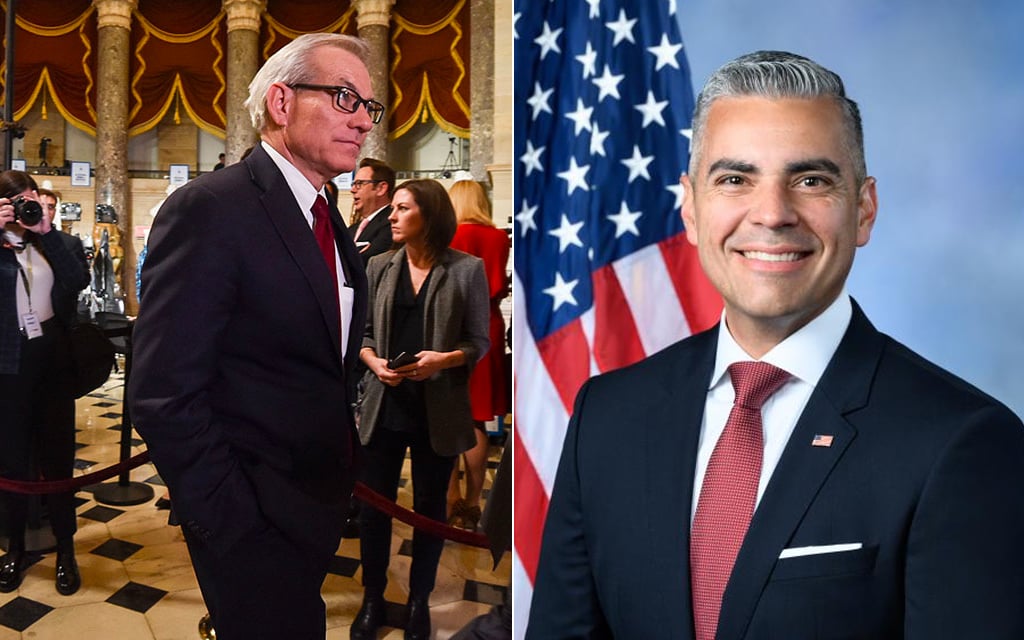
Rep. David Schweikert, R-Fountain Hills, and Rep. Juan Ciscomani, R-Tucson, are being targeted by the Democrats’ congressional campaign arm. (Left: File photo by Christopher Scragg/Cronkite News and Right: Photo courtesy of Juan Ciscomani campaign)
WASHINGTON – The Democrats’ House campaign arm plans to inject $2.8 million into two battleground districts in Arizona, targeting U.S. Reps. David Schweikert and Juan Ciscomani.
Both won by narrow margins in 2022 and Democrats are hoping the presidential race and concerns about abortion rights will motivate voters to put them over the top this time.
Democrats view abortion as pivotal to success in Arizona, where the state’s high court revived an 1864 law that enforced a near-total ban The Legislature repealed that ban but the issue remains top of mind for many voters.
“House Republicans are doing everything they can to chip away at reproductive freedom towards their ultimate goal of passing a nationwide abortion ban,” said U.S. Rep. Suzan DelBene, chair of the Democratic Congressional Campaign Committee (DCCC), on a Thursday call with reporters. “We are holding Republicans accountable for their extreme anti-abortion stances. Come November we’ll take back the House of Representatives and defend our rights.”
Republicans hold a four-seat edge in the House; control after November could hinge on a handful of swing districts in battleground states, including the two Arizona districts the Democrats are targeting.
President Joe Biden carried the state by 10,000 votes in 2020 and currently trails Donald Trump by 5 percentage points in a recent CBS/YouGov poll.
Democrats say they’ll spend $1.6 million on broadcast and digital ads in the Phoenix media market, which reaches Schweikert’s district, and $1.2 million in Tucson, Ciscomani’s hometown.

Rep. Juan Ciscomani, R-Tucson, with Rep. Greg Stanton, D-Phoenix (left) at June 12 Congressional Baseball Game in Washington. (Photo by Morgan Kubasko/Cronkite News)
Schweikert was elected to Congress in 2010. His district has been ruby red for most of his tenure. But redistricting ahead of the 2022 election left him with a far more competitive and unstable landscape. He eked out a seventh term by just 3,000 votes, a 1 percentage point margin.
Ciscomani, a freshman, got to Congress with a slightly stronger wind at his back, defeating Democrat Kirsten Engel by just over 5,000 votes for the open seat.
Engel, seeking a rematch, is unopposed for this year’s nomination. The incumbent has one challenger in the July 30 GOP primary.
Schweikert has two primary challengers and a half-dozen Democrats vying for the right to face him in the fall.
The nonpartisan Cook Political Report rates both seats as toss-ups. An analysis from the state’s independent redistricting commission shows Republicans hold an edge under 3% in each district.
This year’s DCCC commitment eclipses the $190,000 it spent in 2022 against Schweikert and Ciscomani – a sum that Arizona Democrats viewed as half-hearted.
Anita Malik, a Democrat who lost to Schweikert in 2018, said the party has never had “the ground support in a way that you need to really overcome the registration advantage that the Republicans still have.”
Secretary of State data shows that in Schweikert’s district, registered Republicans outnumber Democrats 188,000 to 134,000, with 158,000 independents. Ciscomani’s edge is narrower: 184,000 Republicans to 159,000 Democrats, and 166,000 independents.
Democrats are hoping the national money will help drive up turnout among the base, and help them reach swing voters.
“Kirsten was outspent last cycle 6:1,” Engel’s campaign manager, Alia Kapasi, said by email. “We’re looking forward to having the resources this time around to communicate our message with voters.”
The DCCC’s outlay in the Arizona races is 10% of a $28 million funding round announced Tuesday, aimed at swing districts in Michigan, Nevada, and Pennsylvania – which, like Arizona, are also presidential battlegrounds.

Kirsten Engel, a law professor at the University of Arizona who lost in 2022 to Rep. Juan Ciscomani, R-Tucson, is seeking a rematch in 2024. She is unopposed for the Democratic nomination. (Photo courtesy of Engel for Arizona campaign)
The GOP counterpart, the National Republican Congressional Committee, downplayed the Democrats’ plans.
“Arizona will be an uphill battle for extreme Democrats mired in a six-way primary” in the Schweikert district, “stuck with radical retread Kirsten Engel … and facing Arizonans’ furor over inflation and the border crisis,” NRCC spokesman Ben Petersen said in a statement to Cronkite News.
“The NRCC will ensure Arizonans see the clear contrast between these far-left Democrats and Rep. Ciscomani and Schweikert’s common-sense records,” he said.
Democrats will be seeking to harness a boost in turnout they expect from an abortion rights amendment slated to be on November’s ballot.
A Fox News poll this month found that 70% of Arizona voters support a state constitutional amendment protecting the right to abortion through fetal viability, about 24 weeks, or to protect the patient’s health.
The two embattled incumbents have A+ ratings from Susan B. Anthony Pro-Life America, an influential anti-abortion group.
Ciscomani labeled the Arizona Supreme Court’s ruling in April that revived an 1864 near-total ban on abortion, a “disaster” and said he instead supported the more recent state law banning abortion after 15 weeks of pregnancy.
He has supported a ban on federal funds to pay for abortions. The Appropriations Committee, on which he sits, sought to curb access to mifepristone, the drug used in nearly two-thirds of abortions nationwide.
Schweikert had cosponsored a Life at Conception Act in the House six times before withdrawing his support last year.

